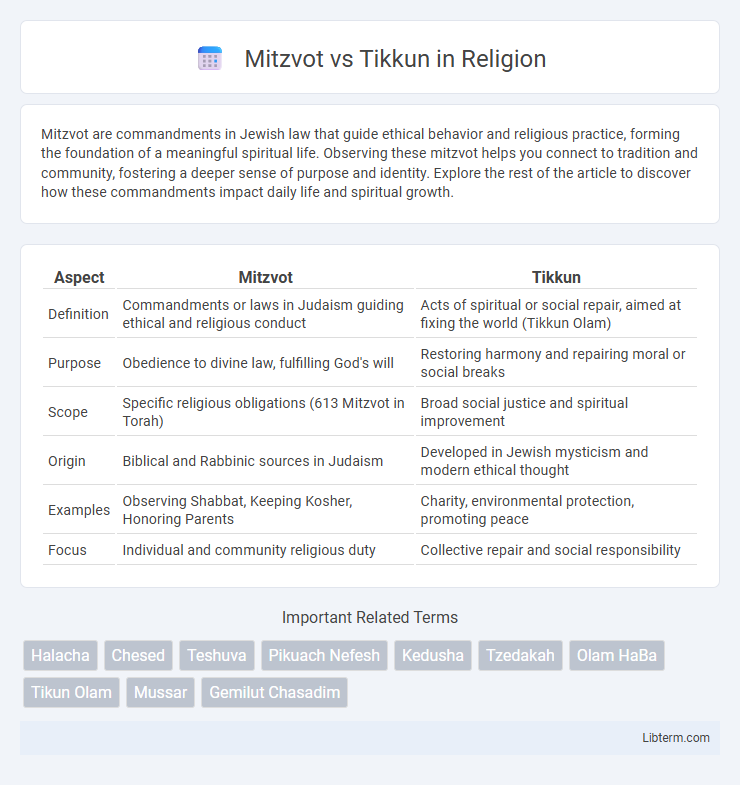Mitzvot are commandments in Jewish law that guide ethical behavior and religious practice, forming the foundation of a meaningful spiritual life. Observing these mitzvot helps you connect to tradition and community, fostering a deeper sense of purpose and identity. Explore the rest of the article to discover how these commandments impact daily life and spiritual growth.
Table of Comparison
| Aspect | Mitzvot | Tikkun |
|---|---|---|
| Definition | Commandments or laws in Judaism guiding ethical and religious conduct | Acts of spiritual or social repair, aimed at fixing the world (Tikkun Olam) |
| Purpose | Obedience to divine law, fulfilling God's will | Restoring harmony and repairing moral or social breaks |
| Scope | Specific religious obligations (613 Mitzvot in Torah) | Broad social justice and spiritual improvement |
| Origin | Biblical and Rabbinic sources in Judaism | Developed in Jewish mysticism and modern ethical thought |
| Examples | Observing Shabbat, Keeping Kosher, Honoring Parents | Charity, environmental protection, promoting peace |
| Focus | Individual and community religious duty | Collective repair and social responsibility |
Understanding Mitzvot: Definition and Significance
Mitzvot are commandments in Jewish law that guide ethical behavior and religious practice, encompassing 613 specific obligations derived from the Torah. These commandments serve as a framework for living a life aligned with divine will, emphasizing actions such as charity, Sabbath observance, and ethical conduct. Understanding mitzvot involves recognizing their role in fostering spiritual discipline and communal responsibility within Judaism.
What is Tikkun? Exploring the Concept of Repair
Tikkun, derived from the Hebrew word meaning "repair" or "rectification," centers on the spiritual and ethical restoration of oneself, society, and the world. Unlike Mitzvot, which are specific commandments or good deeds prescribed by Jewish law, Tikkun represents a broader, ongoing process of healing broken relationships and correcting injustices. This concept is deeply embedded in Jewish mysticism and ethical teachings, emphasizing proactive efforts to mend spiritual and social fractures for holistic transformation.
Historical Origins: Mitzvot and Tikkun in Jewish Tradition
Mitzvot, rooted in the Torah, are the 613 commandments given to the Jewish people as divine instructions for ethical and religious conduct, originating from the covenant between God and Moses at Mount Sinai. Tikkun, derived from the concept of "Tikkun Olam" (repairing the world), emerged later in Jewish mystical and ethical teachings, particularly within Kabbalah and Hasidic thought, emphasizing spiritual and social rectification. The historical origins of Mitzvot are foundational to Jewish law, while Tikkun represents an evolving interpretation focused on healing and improving both individual souls and society.
Core Differences: Mitzvot vs. Tikkun
Mitzvot are commandments rooted in Jewish law, defining specific actions and duties prescribed by the Torah, such as observing the Sabbath and dietary restrictions. Tikkun emphasizes spiritual repair and ethical rectification, focusing on personal and cosmic restoration through acts of kindness and social justice. While mitzvot are concrete obligations, tikkun represents a broader, transformative process aimed at healing both the individual soul and the world.
Theological Foundations and Scriptural Sources
Mitzvot, rooted in the Torah, are divine commandments emphasizing obedience to God's law as found in Exodus and Deuteronomy, serving as the foundation of Jewish ethical and ritual practice. Tikkun, derived from Kabbalistic teachings and prophetic texts such as Ezekiel and Isaiah, centers on spiritual repair and restoration of the world, reflecting a deeper mystical mission beyond the letter of the law. The theological foundation of Mitzvot involves covenantal duty, whereas Tikkun embodies a transformative process aimed at cosmic harmony and rectification of spiritual flaws.
Practical Application: Living Mitzvot vs. Pursuing Tikkun
Living mitzvot involves the practical application of Jewish commandments through daily actions, fostering ethical behavior and spiritual discipline. Pursuing tikkun centers on repairing the world by addressing social justice, healing relationships, and promoting communal well-being. Both concepts intertwine, as performing mitzvot serves as tangible steps toward achieving the broader goal of tikkun olam.
Mitzvot as Commandments: Legal and Ethical Dimensions
Mitzvot serve as foundational commandments in Judaism, encompassing both legal obligations and ethical imperatives that guide daily conduct and spiritual practice. These 613 commandments cover a broad spectrum of life, from rituals and dietary laws to social justice and interpersonal behavior, creating a comprehensive framework for moral and communal order. Their dual nature as legal mandates and ethical guidelines underscores the integral role of mitzvot in uniting divine instruction with human responsibility.
Tikkun Olam: Social Action and Global Responsibility
Tikkun Olam emphasizes the Jewish commitment to social action and global responsibility, urging individuals to repair the world through justice, compassion, and ethical behavior. While Mitzvot represent specific commandments in Jewish law, Tikkun Olam transcends ritual obligations by promoting proactive efforts to address societal injustices, environmental concerns, and community welfare. This concept drives initiatives in philanthropy, human rights advocacy, and sustainable development within Jewish communities and beyond.
Contemporary Perspectives: Modern Interpretations
Modern interpretations of mitzvot emphasize their role as dynamic ethical commands that adapt to evolving societal contexts, reflecting a commitment to social justice and personal growth. Contemporary scholars view tikkun not only as spiritual repair but also as proactive engagement with global issues like environmental sustainability and human rights. This shift broadens traditional understandings, integrating mitzvot and tikkun into practical frameworks for modern moral responsibility.
Integrating Mitzvot and Tikkun in Daily Jewish Life
Integrating mitzvot and tikkun in daily Jewish life involves actively fulfilling commandments while pursuing spiritual and social repair. Mitzvot, the divinely commanded rituals and ethical duties, provide a structured framework that guides moral conduct, whereas tikkun represents the ongoing effort to heal and perfect both the individual soul and the broader community. Harmonizing these concepts encourages Jews to engage in purposeful actions that foster personal growth and contribute to universal healing and justice.
Mitzvot Infographic

 libterm.com
libterm.com